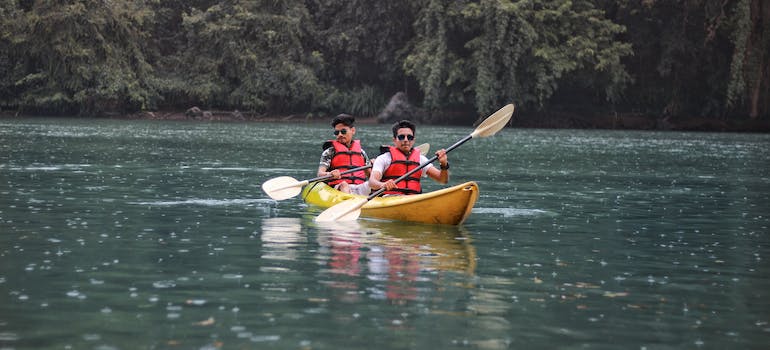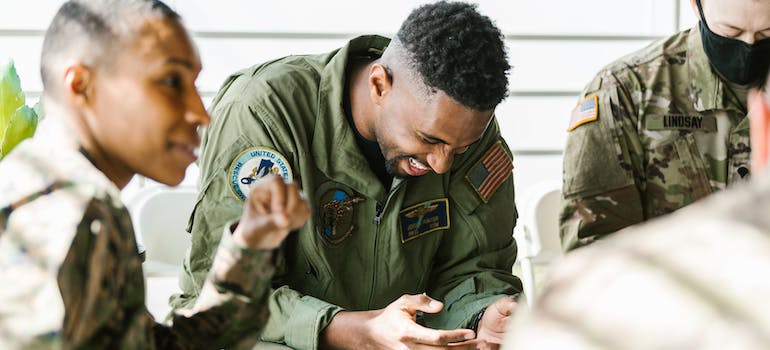During adventure-based therapy in West Virginia, healing and growth go hand in hand with nature’s wonders. In WV, the great outdoors aren’t just a backdrop; they’re a key part of your journey to wellness. Nowadays, rehabs in WV are blending thrilling adventures with therapy, offering a fresh alternative to traditional methods. This isn’t just about tackling nature’s challenges; it’s about overcoming your own personal hurdles. With activities tailored to help you reflect and grow, you’ll find yourself on a path of self-discovery, all while surrounded by West Virginia’s breathtaking scenery.
What Is Adventure-Based Therapy?
Adventure-Based Therapy (ABT) is a unique approach that combines outdoor activities with therapeutic techniques. It’s more than just an outdoor adventure; it’s a journey toward self-discovery and healing. In ABT, activities like rock climbing or kayaking are not just physical challenges but also opportunities for emotional growth.

This therapy is about pushing your limits and learning resilience in the face of obstacles, much like the challenges we face in life. It’s a hands-on approach that encourages you to engage actively with your healing process, making it a powerful tool for personal development. This approach is particularly impactful for substance abuse treatment in WV, where the natural environment adds an extra layer of tranquility and challenge to the healing process. ABT is not just about talking through problems; it’s about living through them and learning in a way that words alone can’t always capture.
The Origins and Principles of Adventure-Based Therapy in West Virginia
Adventure-Based Therapy (ABT) emerged in the 1960s, inspired by the experiential education movement. It’s rooted in the belief that challenging outdoor activities can be powerful catalysts for personal growth, healing, and fighting addiction. The key principles guiding ABT include:
- Experiential Learning: This principle emphasizes learning through direct experience and reflection, allowing individuals to gain insights and skills through active participation in activities.
- Challenge by Choice: ABT operates on the philosophy that participants should choose their level of challenge. This empowers them to take ownership of their experiences and growth.
- Natural Consequences: In ABT, individuals learn from the direct consequences of their actions within a safe and supportive environment. This approach promotes accountability and self-awareness.
Adventure Activities in West Virginia’s ABT Programs
Adventure-Based Therapy programs in West Virginia incorporate a variety of outdoor activities that are not just thrilling but also therapeutically beneficial. These include:
- Rock Climbing and Hiking: These activities challenge physical limits and teach perseverance, problem-solving, and trust.
- Canoeing and Rafting: Water-based activities emphasize teamwork, communication, and coping with change.
- Ropes Courses: High and low ropes courses are used to build confidence, trust, and cooperation among participants.

Integrating these activities into addiction therapy, ABT programs in West Virginia use the natural landscape to create meaningful therapeutic experiences. The challenges faced during these activities serve as metaphors for personal obstacles, providing participants with a unique perspective on their capabilities and strategies to overcome life’s hurdles. This integration of physical challenges with emotional and psychological support makes ABT a holistic approach to healing and personal development.
Benefits of Adventure-Based Therapy in West Virginia
Adventure-Based Therapy (ABT) isn’t just an exhilarating experience; it’s a powerful tool for enhancing both your physical and mental health. Imagine the sense of achievement you feel after a challenging hike or the calmness that envelops you by a serene lakeside. ABT offers these experiences, improving your fitness and coordination while also nurturing your mental well-being.
It’s about building resilience and self-esteem as you conquer each obstacle, whether it’s scaling a rock face or navigating a river. These activities teach you problem-solving skills and mindfulness, helping to alleviate stress and anxiety. The beauty of ABT is in its ability to provide real-life lessons in overcoming challenges, giving you strategies and insights that are invaluable in everyday life.
Adventure-Based Therapy in West Virginia for Different Age Groups
ABT is a versatile path to healing and growth, suitable for all ages. For children and teenagers, it’s like an adventurous playground that teaches life skills. They learn teamwork, leadership, and responsibility while having fun. Imagine a group of teens learning to trust and support each other on a ropes course.
For adults, ABT can be a refuge from the stress of daily life, a way to tackle personal challenges or navigate life changes. And it’s not just for the young; older adults find in ABT a way to stay active, keep their minds sharp, and connect with others. Each activity is adapted to fit the participants’ abilities, ensuring everyone, regardless of age, can safely enjoy and benefit from the experience.
Addressing Mental Health and Addiction with ABT
This form of therapy can be a powerful ally in the fight against mental health challenges and addiction, especially for dual diagnosis treatment in West Virginia. Think of it like navigating a forest trail – each step represents progress in managing mental health and overcoming addiction. ABT helps by providing a supportive, natural setting where individuals can confront and work through their issues.
Techniques used in ABT, such as team-building exercises or solo challenges, are designed to build resilience, self-esteem, and coping skills. These activities mirror the challenges of recovery, offering practical lessons in perseverance and personal strength. If you or your loved one is facing the intertwined complexities of mental health and addiction, ABT offers a path to healing that is as engaging as it is effective.
The Role of Therapists and Guides
In Adventure-Based Therapy (ABT), therapists and guides are indispensable, particularly when integrating ABT with medication assisted treatment in West Virginia. Our professionals are not just experts in safe outdoor adventure; they are also skilled in providing emotional and psychological support. They tailor each activity to individual needs, considering both physical abilities and therapeutic goals. This is especially crucial when ABT forms part of a broader treatment plan, including medication-assisted therapy.
Their role extends beyond ensuring physical safety; they offer emotional support, helping participants to process their experiences and emotions. This transforms each activity into a meaningful step toward healing. They collaborate closely with medical professionals to align the adventurous activities of ABT with the overall treatment objectives, making them much more than instructors – they are mentors and supporters on the journey of self-discovery and recovery.

Seasonality of ABT Programs in West Virginia
Adventure-Based Therapy (ABT) programs in West Virginia offer unique experiences throughout the year, adapting to each season’s beauty and challenges. Here’s how ABT changes with the seasons:
Spring:
- Activities like hiking and mountain biking come alive with the blooming landscapes.
- Spring’s mild weather is perfect for beginning outdoor group therapy sessions.
Summer:
- Ideal for water-based activities such as kayaking and canoeing in West Virginia’s rivers.
- Summer camps focusing on team-building and personal development are popular.
Fall:
- The colorful foliage sets a stunning backdrop for rock climbing and backpacking.
- Cooler temperatures are great for longer treks and reflective solo journeys.
Winter:
- Snowshoeing and cross-country skiing offer a serene, introspective ABT experience.
- Indoor climbing and group workshops continue the therapeutic journey in colder months.
Each season brings its own set of activities, ensuring that ABT in West Virginia is a year-round opportunity for growth, healing, and connection with nature.

Integrating ABT with Other Therapies
Integrating Adventure-Based Therapy (ABT) with other therapeutic modalities creates a comprehensive, holistic therapy for addiction and mental health treatment. Imagine ABT as a piece of a larger puzzle, where each piece represents a different therapy method. When combined, they form a complete picture of healing. ABT’s active, experiential nature complements more traditional therapies like cognitive-behavioral therapy or group counseling.
This combination allows individuals to not only talk through their challenges but also to physically and emotionally experience healing in real time. The benefits of this holistic approach are profound. It ensures a well-rounded treatment, addressing the mind, body, and spirit. By engaging in ABT alongside other therapies, individuals gain a more diverse set of tools to navigate their recovery journey, leading to more sustainable and meaningful outcomes.
Safety Measures in ABT
Safety is our top priority in Adventure-Based Therapy (ABT), ensuring every participant’s well-being throughout their journey. Here are the key safety protocols in place:
- Trained Professionals: Activities are led by certified instructors who are also trained in therapeutic techniques, ensuring a safe and supportive environment.
- Risk Assessments: Before any activity, thorough risk assessments are conducted to identify and mitigate potential hazards.
- Appropriate Gear: Participants are equipped with the necessary safety gear, such as helmets for climbing or life jackets for water activities.
- Health Screenings: Prior to enrollment, health screenings ensure that activities align with each participant’s physical capabilities.
- Emergency Protocols: Clear emergency procedures are established, including first aid readiness and quick access to medical assistance if needed.
- Regular Training: Regular training sessions for staff to stay updated on safety protocols and therapeutic approaches.
Specialized Programs for Veterans and Specific Groups
In West Virginia, Adventure-Based Therapy (ABT) extends its healing touch to specific groups, including tailored rehab for veterans. Our specialized programs recognize the unique experiences and challenges faced by veterans. They offer a blend of physical challenges and therapeutic support designed to address issues like PTSD, reintegration difficulties, and building trust.
- For Veterans: Activities are often team-oriented, reflecting military experiences but in a supportive, healing environment. This approach helps in rebuilding camaraderie and trust, essential elements often missed after service.
- Other Groups: Similarly, programs for other specific groups, like adolescents or those with specific mental health challenges, focus on activities that promote skills relevant to their experiences. For instance, a program for teens might focus more on building self-esteem and peer relationships.

Finding and Enrolling in ABT Programs
Discovering and joining Adventure-Based Therapy (ABT) programs in West Virginia can be a straightforward process. Start by researching online for ABT programs or drug rehab centers in WV that offer this therapeutic approach. Many centers have detailed websites explaining their programs, activities, and enrollment procedures. You can also reach out to local mental health professionals or addiction specialists who can provide recommendations based on your specific needs.
Additionally, consider contacting West Virginia’s health services or local support groups for guidance. Once you’ve identified potential programs, reach out to them directly to inquire about availability, costs, and any prerequisites for participation. Remember, the right program should align with your personal recovery goals and provide the support you need on your journey to wellness.
Aftercare and Ongoing Support
After completing an Adventure-Based Therapy (ABT) program, the journey doesn’t end there. Post-therapy support is crucial for lasting recovery and growth. Many programs in West Virginia offer aftercare options, including individual therapy for addiction, group counseling, and online support networks. These resources provide a safety net, helping you apply the skills and insights gained during ABT to everyday life.

Continued care is essential; it reinforces the positive changes and coping strategies you’ve developed. Think of it like nurturing a plant after it’s been repotted; the right support helps it thrive in its new environment. Engaging in ongoing therapy and support groups ensures that the progress made during ABT is sustained and built upon, paving the way for a healthier, more resilient future.
Transforming Lives with Adventure-Based Therapy in West Virginia
As we wrap up our journey through adventure-based therapy in West Virginia, one thing is crystal clear: this isn’t just an escape from everyday life. It’s a powerful path to deep personal change. In the welcoming arms of West Virginia’s treatment centers, you’ll find more than expert guidance. You’ll connect with nature in a way that opens doors to profound healing and personal growth. Adventure-based therapy here is proof of how blending therapy with nature can work wonders. Whether you’re battling personal hurdles or just eager to understand yourself better, this therapy offers a road to wellness that’s as exciting and fulfilling as the adventures it holds.



